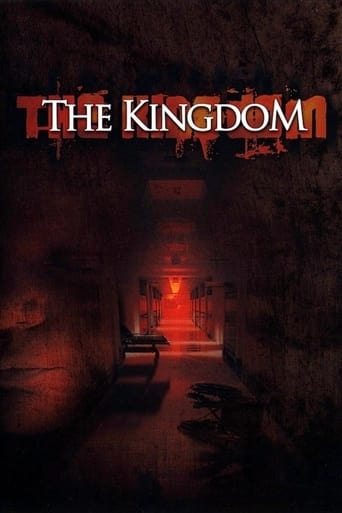gogoschka-1
Lars von Trier's weird, crazy TV show about a haunted hospital with an amazing atmosphere and a great cast. Shows that you don't need a lot of money as long as you've got great actors, good writing and the perfect location. Shot entirely on an ordinary video camera, this is "no budget" Arthouse cinema. The second part of the series is just as good, and I only wish we would have gotten the originally planned third part as well, but the untimely death of the lead actor sadly prevented this from ever happening. Still, let's enjoy what we got. 9 stars out of 10.In case you're interested in more underrated masterpieces, here's some of my favorites:imdb.com/list/ls070242495
stevenbeales
If you get a chance to watch this TV series, please do so as you will be well rewarded. More bizarre than Twin Peaks, this series of 8 episodes is eerie and unsettling throughout, always surprising you with the next unexpected, supernatural revelation. It is an early showcase for the talent Von Trier was to show in his later movies and contains many unforgettable characters from Stig Helmer to Udo Kier's baby calling for its mama to the precognitive Down's syndrome children.Stephen King's American remake Kingdom Hospital doesn't hold a candle to Von Trier's original.
T Y
The only thing this series demonstrates is: - Lars von Trier wanted to dabble in something like Twin Peaks - Lars von Trier is capable of making lousy TV too.The television format has a way of liberating everyone's inner hack. The 'running series' presents difficulties that are always solved conventionally. Namely, execs & advertisers live in horror that a narrative payoff will come too quickly, which produces two horrible cop-outs: a teaser before every commercial (which threatens that something is about to happen), followed by the complete dissipation of that potential after the commercials are over; and the chronically-delayed promise that something of interest will occur over every ten or twenty episodes. That payout is simply too low.Although cable isn't hampered by commercials, there is still a deep fear of giving anything away and losing viewers. This fosters and grows viewers that clear time from their lives to receive each new worthless update. I have found each new "series of excellence" (or so I'm told by critics and friends - Soparanos, Lost, Deadwood, Six Feet Under) to be just as crappy as regular mediocre TV; ruined by the format itself. I watch these shows and all I see is the meandering which occurs as storyteller strings you along with delays and non-committals, etc.. Then, in disappointment, I picture the conventional minds that would tune in again and again.Do I have stronger eyes than most people? How on earth could von Trier make this crap after Zentropa? If I see one more "Ghost Needs Closure" movie, I'm going to help the creators become ghosts themselves.
MrVibrating
Von Trier's Riget is his playground. It's fun watching and you can sense it was fun making. The cast all give top-notch performances, which is rare if there is only money involved. The directing is inspired and ambitious and best of all, it works, hand camera and all.Riget is also a tour-de-force for Ernst-Hugo, a man who left my home town in his youth never to return. His cynical, out-of-his depth, partly incompetent and totally danophobic Swede Stig-Helmer is one of the funniest and best-played characters I've ever seen. He dominates every scene he's in, and his monologues on top of the hospital are priceless.The rest of the cast do their best to overshine Jähregård, and they're not far behind. Krogshöj, Stig-Helmers nemesis, is really memorable, with a really unsettling gaze. Fru Drusse, played by Kirsten Rolffes, is another great character, utterly believable and also very funny. Then there's Bulder, Rigmor, the incompetent hospital director Moesgaard and his love-sick medical-student son, the mongoloid dish-washers, the elderly gentlemen of the secret society, and so on and so on.The plot is a simple ghost hunt thing, nothing special. It's the quirks and the characters that move Riget forward. In four hours time, not a lot has happened on a larger scale, but you will still be sorting through all the details.Riget is the concrete evidence that the Danish movie culture is superior to the Swedish. One can only hope we will ever produce something as great as this.






